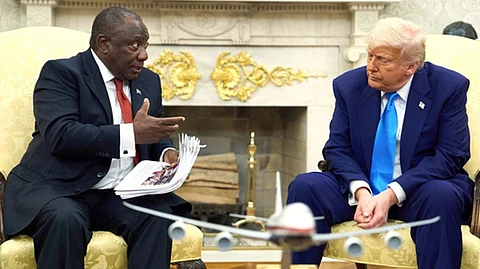

A high-stakes meeting at the White House on Wednesday turned contentious as U.S. President Donald Trump directly confronted South African President Cyril Ramaphosa with controversial and unfounded claims of violence and land seizures targeting white citizens in South Africa—a narrative South Africa has repeatedly refuted.
The Oval Office encounter, initially framed as a diplomatic effort to reset strained relations, quickly escalated when Trump presented videos and printed articles to support his assertion that white South Africans were facing systematic persecution, including so-called “land confiscations” and targeted killings.
“People are fleeing South Africa for their own safety. Their land is being confiscated, and in many cases, they’re being killed,” Trump said, while referencing inflammatory footage and citing controversial South African political figures such as Julius Malema.
President Ramaphosa, maintaining composure throughout the exchange, challenged Trump’s assertions, stating: “Crime is a serious issue in South Africa, but the majority of victims are Black.” When Trump replied, “The farmers are not Black,” Ramaphosa responded diplomatically, “These are concerns we are willing to talk to you about.”
South Africa Firmly Rejects 'White Genocide' Narrative
In a post on X (formerly Twitter), South Africa’s foreign ministry reiterated: “There is no land confiscation.” Officials emphasized that land reform laws in South Africa only allow expropriation without compensation under narrow public interest criteria—such as unused land—and no such confiscations have taken place. The government also noted that all land reform decisions are subject to judicial oversight.
The South African delegation, which included prominent golfers Ernie Els and Retief Goosen, and billionaire businessman Johann Rupert, aimed to focus the visit on trade negotiations and critical minerals cooperation. Rupert defended Ramaphosa’s remarks, emphasizing that violent crime affects all communities and citing statistics showing that Black South Africans are the majority of murder victims.
Rupert also referenced Elon Musk, a South Africa-born billionaire and vocal Trump ally, suggesting Musk’s Starlink satellite internet service be installed in every police station to aid crime prevention. Musk, who was present at the meeting, has been a prominent promoter of the “white genocide” narrative online, further fueling tensions.
Diplomatic Fallout and Trade Implications
The meeting comes amid increasing diplomatic pressure from the Trump administration, which has suspended foreign aid to South Africa, expelled its ambassador, and imposed up to 31% tariffs under the "Liberation Day" trade policy.
Trump has also harshly criticized South Africa's legal action against Israel at the International Court of Justice (ICJ), calling it a political attack and accusing Pretoria of anti-Israel bias. Ramaphosa’s visit was seen as an attempt to cool tensions, secure economic agreements, and push for the inclusion of Starlink in the country’s digital infrastructure.
Background and Broader Context
The allegations raised by Trump echo claims he first made in 2018 and have been repeatedly debunked by human rights organizations and South African crime statistics. The vast majority of violent crime victims in South Africa are Black, with murders often linked to broader social issues, not racial targeting.
Since beginning his second term, Trump has increasingly adopted hardline rhetoric toward South Africa, aligning with far-right narratives and amplifying Musk’s claims online. The South African government has strongly condemned these statements as inflammatory and baseless.
Despite the tense exchange, President Ramaphosa reiterated his intention to work with the U.S., stating: “We are essentially here to reset the relationship between the United States and South Africa.”